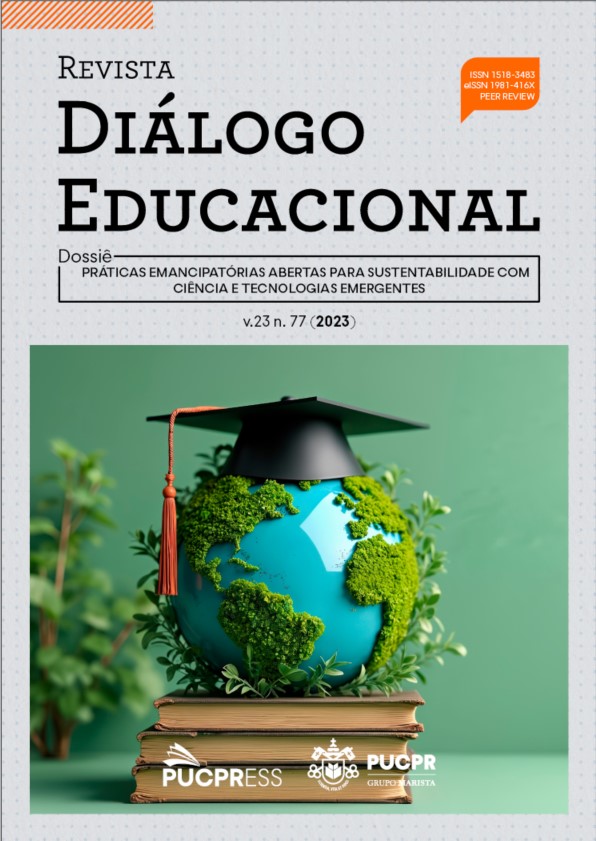ATLAS.ti contributions to the quality of a qualitative research with the grounded theory method
DOI:
https://doi.org/10.7213/1981-416X.23.077.AO08Abstract
Reports that discuss in detail the methodological approach used in research, its application, and data collection and analysis procedures are fundamental to guide the decision-making process in future studies. Likewise, they contribute to making upcoming analyses more consistent, meeting the precepts of quality in qualitative research. To share experience and promote innovation in qualitative analysis procedures, we describe, in this article, the specificities and contributions of ATLAS.ti in grounded theory research in Education. Therefore, we present the key features of the grounded theory, the quality of qualitative research, and the ATLAS.ti software. Furthermore, we describe the methodological direction of the study, carried out in a doctoral thesis. Besides the agility and support to organize documents when there is a large volume of data, it is concluded that ATLAS.ti assists in executing an analysis plan. It also contributes to maintaining proximity to the data already collected, which is an essential process for performing the grounded theory and strengthening the link between reality and the interpretation of the researcher. The confirmation and transparency of the results, however, are the best contribution of the software, which enhances its verification.
Downloads
References
BRENNAND, E. G. de G.; LIMA, A. J. F. de. A contribuição de três tradições da teoria fundamentada para a pesquisa educacional. Cadernos de Educação, n.64, p.150-167, 2020.
CHARMAZ, K. A Construção da Teoria Fundamentada: guia prático para análise qualitativa. Porto Alegre: Artmed,
COUTINHO, C. P. A qualidade da investigação educativa de natureza qualitativa: questões relativas à fidelidade e validade. Educação Unisinos, v. 12, n. 1, p. 5-15, 2008. Disponível em: http://www.revistas.unisinos.br/index.php/educacao/article/view/5291.
CRESWELL, J. W. Investigação qualitativa & projeto de pesquisa: escolhendo entre cinco abordagens. 3 ed. Porto Alegre: Artmed, 2014.
DIAZ-BAZO, C. Strategies to ensure the quality of qualitative research. The case of articles published in Education journals. Revista Lusofona de Educação, v. 44, n. 44, p. 29-45, 2019. Edicoes Universitarias Lusofonas. Disponível em: https://www.redalyc.org/jatsRepo/349/34962082004/index.html.
LINCOLN, Y. S.; GUBA, E. G. Naturalistic inquiry. Beverly Hills, CA: Sage, 1985.
MEYER, P.; VOSGERAU, D. S. R. Princípios para concepção de um portal para o desenvolvimento profissional da docência na educação superior, 2018. Pontifícia Universidade Católica do Paraná. Disponível em: https://pergamum-biblioteca.pucpr.br/acervo/341398?_ga=2.213708945.429914505.1684774699-1571785122.1676571428.
MEYER, P.; VOSGERAU, D. S. A. R. ; ZOPPO, B. M. ; LELIS, D. A. J. Retrato da pesquisa quando jovem: como se faz o pesquisador qualitativo. In: EYING, A. M.; COSTA, R. R. (Org.). Educação e formação de professores: inspirações, espaços e tempos. 1 ed. Curitiba: Editora CRV, 2021, v. 1, p. 265-28.
NASCIMENTO, J. B. do; SILVEIRA C. F. ; CARDOSO, H. S. P; FREITAS, E. M. J. de. A teoria fundamentada em dados aplicada ao campo da educação superior. Research, Society and Development, v. 10, n. 5, p. 1-16, 2021.
PRIGOL, E. L.; BEHRENS, M. A. Teoria Fundamentada: metodologia aplicada na pesquisa em educação. Educação & Realidade, v. 44, n. 3, p. 1-20, 2019.
SAN MARTIN CANTERO, D. Teoría fundamentada y ATLAS.ti: recursos metodológicos para la investigación educativa Grounded Theory and Atlas.ti: Methodological Resources for Educational Research. Revista Electrónica de Investigación Educativa, v. 16, n. 1, p. 104-122, 2014. Disponível em: http://redie.uabc.mx/vol16no1/contenido-sanmartin.html.
STRAUSS, A.; CORBIN, J. Pesquisa qualitativa: técnicas e procedimentos para o desenvolvimento da teoria fundamentada. 2nd ed. Porto Alegre: Artmed, 2008.
TAROZZI, M. O que é a Grounded Theory? Metodologia de pesquisa e de teoria fundamentada nos dados. Petrópolis: Vozes, 2011.
VOSGERAU, D. S. R.; MEYER, P.; CONTRERAS, R. Análise de dados qualitativos nas pesquisas sobre formação de professores. Revista Diálogo Educacional, v. 17, n. 53, p. 909-935, 2017. Disponível em https://periodicos.pucpr.br/index.php/dialogoeducacional/article/view/9237.
WALTER, S. S.; BACH, T. M. Adeus papel, marca-textos, tesoura e cola: inovando o processo de análise de conteúdo por meio do Atlas.ti. Administração: Ensino e Pesquisa, v. 16, n. 2, p. 275-308, 2015.
YIN, R. K. Pesquisa qualitativa do início ao fim. Porto Alegre: Penso, 2016.
Downloads
Published
How to Cite
Issue
Section
License
Copyright (c) 2023 Editora Universitária Champagnat

This work is licensed under a Creative Commons Attribution 4.0 International License.
O(s) autor(es) transfere(m), por meio de cessão, à EDITORA UNIVERSITÁRIA CHAMPAGNAT, pessoa jurídica de direito privado, inscrita no CNPJ/MF sob o n.º 76.659.820/0009-09, estabelecida na Rua Imaculada Conceição, n.º 1155, Prado Velho, CEP 80.215-901, na cidade de Curitiba/PR, os direitos abaixo especificados e se compromete a cumprir o que segue:
- Os autores afirmam que a obra/material é de sua autoria e assumem integral responsabilidade diante de terceiros, quer de natureza moral ou patrimonial, em razão de seu conteúdo, declarando, desde já, que a obra/material a ser entregue é original e não infringe quaisquer direitos de propriedade intelectual de terceiros.
- Os autores concordam em ceder de forma plena, total e definitiva os direitos patrimoniais da obra/material à EDITORA UNIVERSITÁRIA CHAMPAGNAT, a título gratuito e em caráter de exclusividade.
- A CESSIONÁRIA empregará a obra/material da forma como melhor lhe convier, de forma impressa e/ou on line, inclusive no site do periódico da EDITORA UNIVERSITÁRIA CHAMPAGNAT, podendo utilizar, fruir e dispor do mesmo, no todo ou em parte, para:
- Autorizar sua utilização por terceiros, como parte integrante de outras obras.
- Editar, gravar e imprimir, quantas vezes forem necessárias.
- Reproduzir em quantidades que julgar necessária, de forma tangível e intangível.
- Adaptar, modificar, condensar, resumir, reduzir, compilar, ampliar, alterar, mixar com outros conteúdos, incluir imagens, gráficos, objetos digitais, infográficos e hyperlinks, ilustrar, diagramar, fracionar, atualizar e realizar quaisquer outras transformações, sendo necessária a participação ou autorização expressa dos autores.
- Traduzir para qualquer idioma.
- Incluir em fonograma ou produção audiovisual.
- Distribuir.
- Distribuir mediante cabo, fibra ótica, satélite, ondas ou qualquer outro sistema que permite ao usuário realizar a seleção da obra ou produção para recebê-la em tempo e lugar previamente determinados por quem formula a demanda e nos casos em que o acesso às obras ou produções se faça por qualquer sistema que importe em pagamento pelo usuário.
- Incluir e armazenar em banco de dados, físico, digital ou virtual, inclusive nuvem.
- Comunicar direta e/ou indiretamente ao público.
- Incluir em base de dados, arquivar em formato impresso, armazenar em computador, inclusive em sistema de nuvem, microfilmar e as demais formas de arquivamento do gênero;
- Comercializar, divulgar, veicular, publicar etc.
- Quaisquer outras modalidades de utilização existentes ou que venham a ser inventadas.
- Os autores concordam em conceder a cessão dos direitos da primeira publicação (ineditismo) à revista, licenciada sob a CREATIVE COMMONS ATTRIBUTION LICENSE, que permite o compartilhamento do trabalho com reconhecimento da autoria.
- Os autores autorizam a reprodução e a citação de seu trabalho em repositórios institucionais, página pessoal, trabalhos científicos, dentre outros, desde que a fonte seja citada.
- A presente cessão é válida para todo o território nacional e para o exterior.
- Este termo entra em vigor na data de sua assinatura e é firmado pelas partes em caráter irrevogável e irretratável, obrigando definitivamente as partes e seus sucessores a qualquer título.
- O não aceite do artigo, pela EDITORA UNIVERSITÁRIA CHAMPAGNAT, tornará automaticamente sem efeito a presente declaração.













